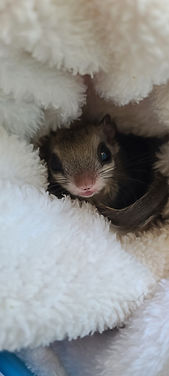

What types of animals do we care for?
Mammals: We specialize in the care of rodents, but accept other non-rabies vector small mammal species on a case-by-case basis. Some of the mammals we have treated are tree and flying squirrels, voles, mice, chipmunks, woodchucks, opossums, cottontails, raccoons (and more!).
We are not currently taking newborns of any species
Reptiles and amphibians: we can take in a limited number of reptiles and amphibians, although we are not always able to accommodate large snapping turtles.
When we are at capacity (or for bird rehabilitation) please see Mass.gov
Intakes are open on a case-by-case basis
for all species we work with
Intakes are currently closed for:
Deceased reptiles and eggs: If you find a deceased reptile of any species which you think may have eggs please contact us or another reptile rehabber as the eggs are sometimes salvageable.
Do we accept any Rabies Vector Species?

Short answer: yes, we do!
Long answer: Sort of!
Woodchucks (aka groundhogs) are the RVS species we are most likely able to accommodate; patients are accepted on a case-by-case basis due to capacity limits.
Note: we do not work with category 1 RVS species aside from woodchucks. In MA those other species are defined as: bats, bears, beavers, bobcats, coyotes, fishers, foxes, otters, raccoons, and skunks. Thank you for your understanding!
Fox Fieldwork: in instances where we are available to assist with field capture of sick or injured foxes we will admit the animal for triage and stabilization before transferring to another rehab facility for further care.
I found an INJURED animal:
If they can be caught injured animals need to come into care, either into a rehab or to a wildlife clinic for veterinary assessment. Contain them and keep them warm, dark, quiet, and unfed then contact the appropriate facility:
If the animal is severely injured, for example because it seems to be paralyzed, has a wound which looks like it could require surgery, has extensively broken bones, etc please first contact your nearest wildlife clinic so it can get immediate veterinary care. Here in Central Massachusetts the closest will be:
50 Willard St.
North Grafton, MA 01536
Call them at 508-839-7918 and select the option for ill or injured wildlife. Follow the prompts and they will call you back to discuss.
As a reminder, if an animal is paralyzed or actively dying and would benefit from having its suffering humanely ended, ALL licensed veterinarians in the state are legally allowed to provide euthanasia services to wildlife regardless of whether they routinely work with wild animals or not.
If the injury is not as severe (or if you can't reach a wildlife clinic) please contact us or another wildlife rehabilitator near you.
I think I found an ORPHANED animal:
The first step is to determine whether the animal is actually orphaned or at risk. Some overt signs when baby mammals have been orphaned are when they appear underweight, dehydrated, or have what looks like grains of rice (fly eggs) on them. Sometimes their behavior changes as well- for instance, baby squirrels are notorious for following and climbing on people when orphaned so if you have encountered one displaying this behavior or any of the above signs contact a rehabilitator right away.
For a variety of species-specific info see How To Tell If An Animal Is Orphaned from the Tufts Wildlife Clinic.
If you would like advice about whether an animal might be orphaned or if attempting to reunite the baby with its mom is viable please contact us or another rehabilitator.
Please remember to never handle wildlife with bare hands and, if you need to bring them into care, place them in a well-ventilated container and keep them warm, dark, quiet, and unfed. Giving the incorrect food to an animal can cause injury or even death.
I found a nest of baby bunnies:
Here in Massachusetts the most common wild rabbit is the Eastern Cottontail (ECT) and ECT behavior often gives the erroneous impression that a nest has been abandoned when, in fact, mom is still taking good care of her babies. Let's talk about it!
ECTs are prey animals that any predator would be happy to eat and, boy, do they know it. Mom knows that she is very visible compared to the covered nest and that if she is frequently visiting the nest then the chances of a predator finding her defenseless babies goes way up. Because of this, mother ECTs only visit the nest to nurse the kits twice a day, at approximately dawn and dusk. As a result of this behavior baby ECTs have a much larger stomach capacity than most other mammals- they may only eat twice a day, but they get absolutely everything they need nutritionally during those feeds.
If you have discovered a nest of stable and uninjured baby bunnies and want to tell if they are orphaned or not you can test the nest. To do so place something light and flexible like a string, ribbon, or yarn over the nest in a tic-tac-toe grid and take a before photo for reference. Wait 12-24 hours and compare the grid to the before photo. If it appears disturbed or has moved then mom has come back to feed the babies! If it is unchanged contact a rehabilitator.


